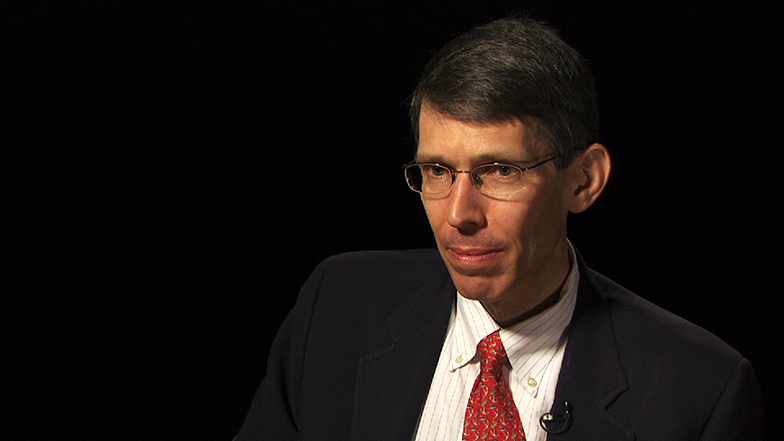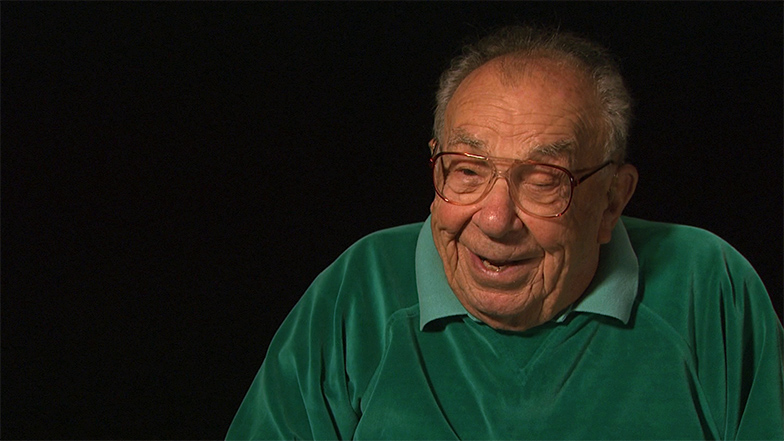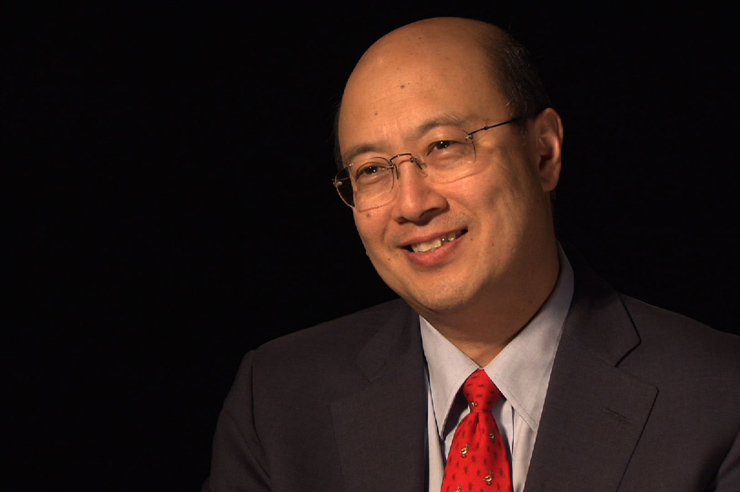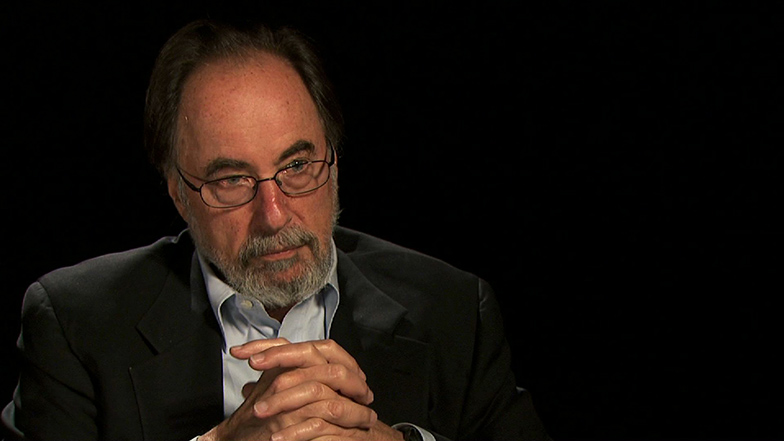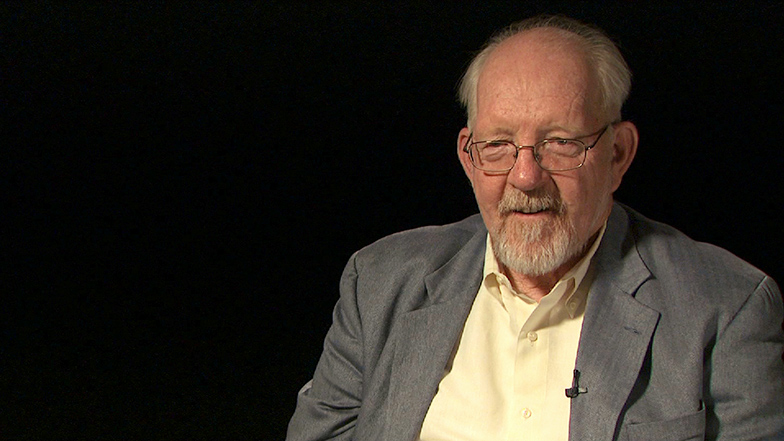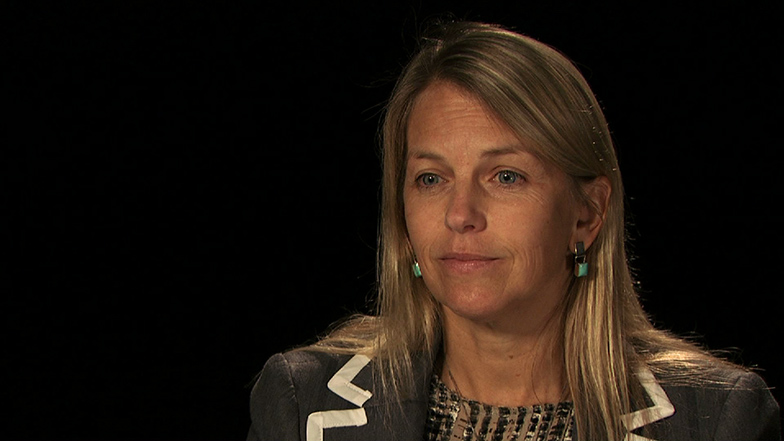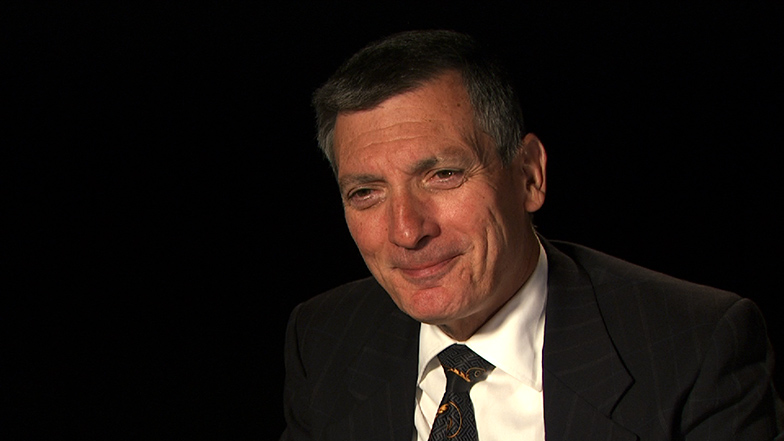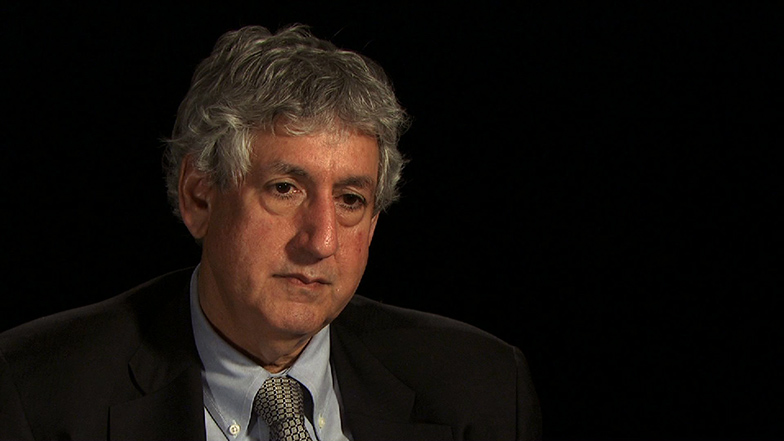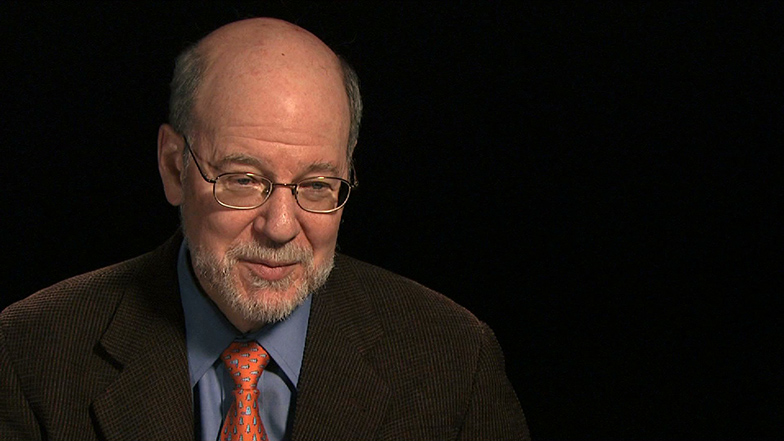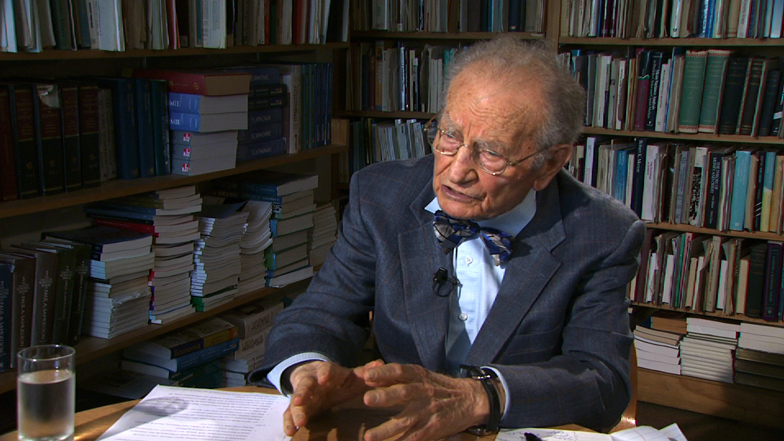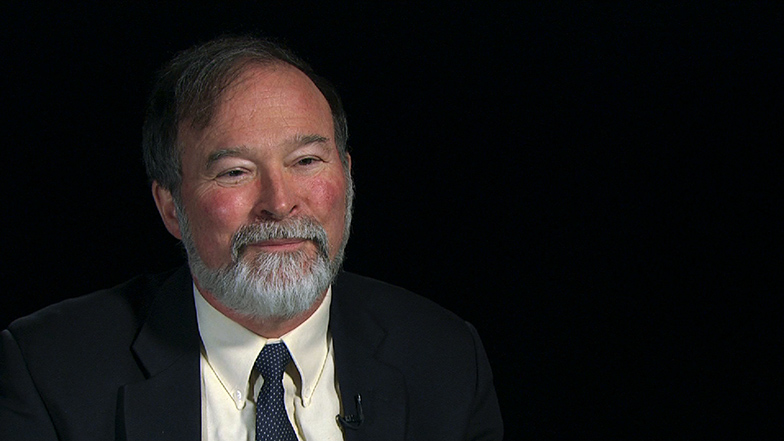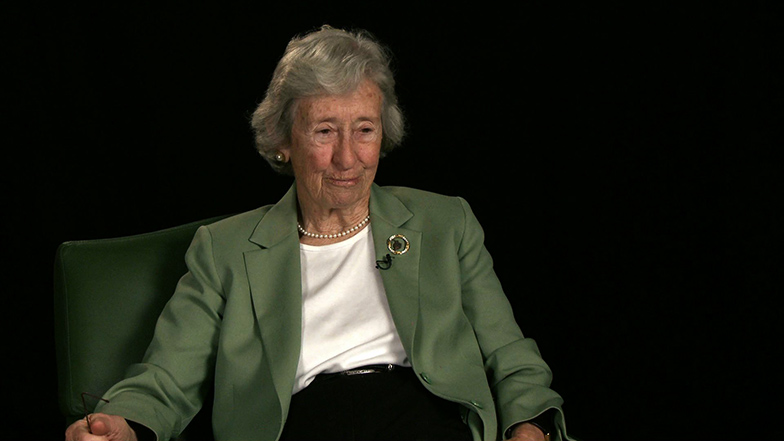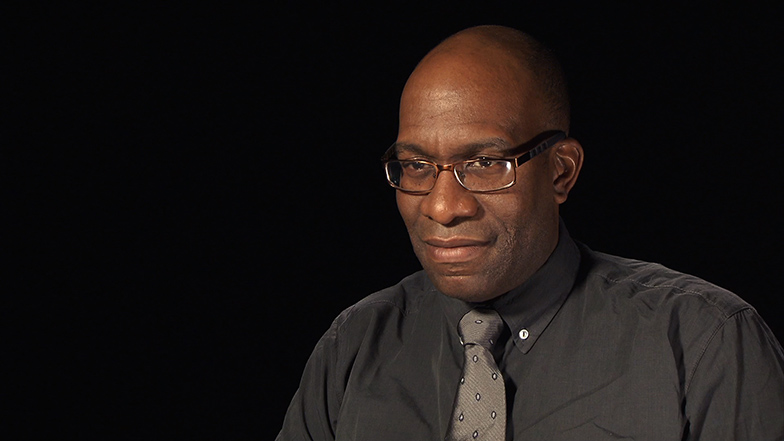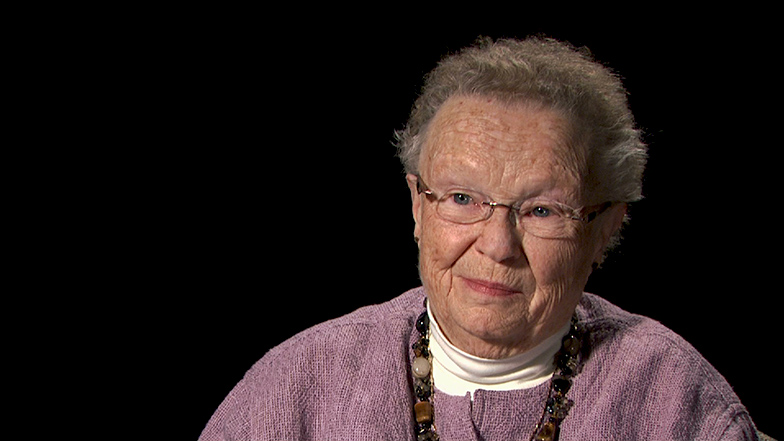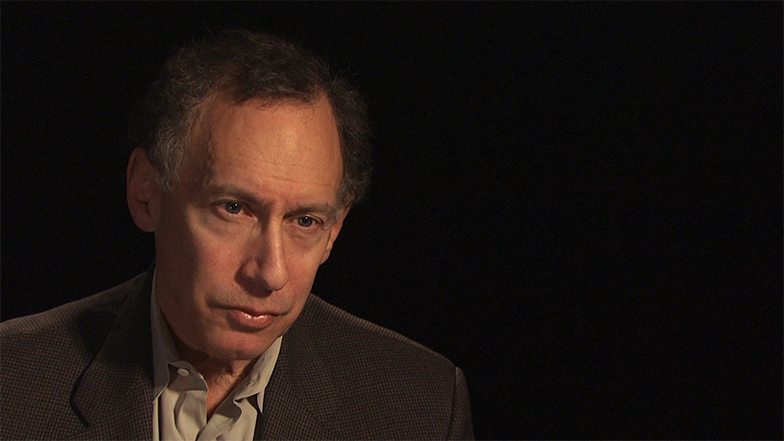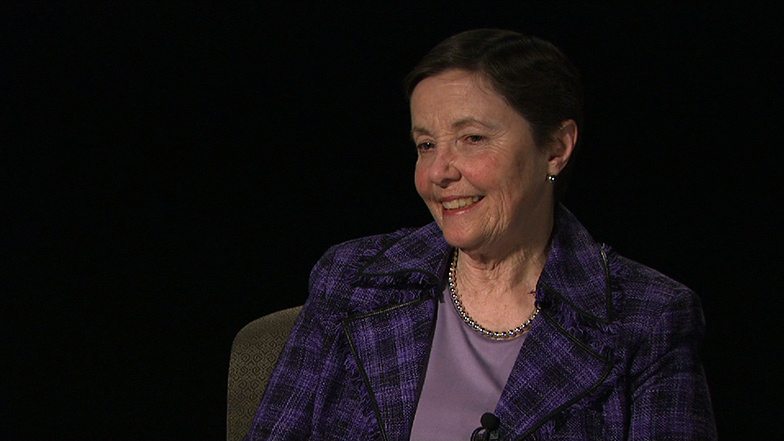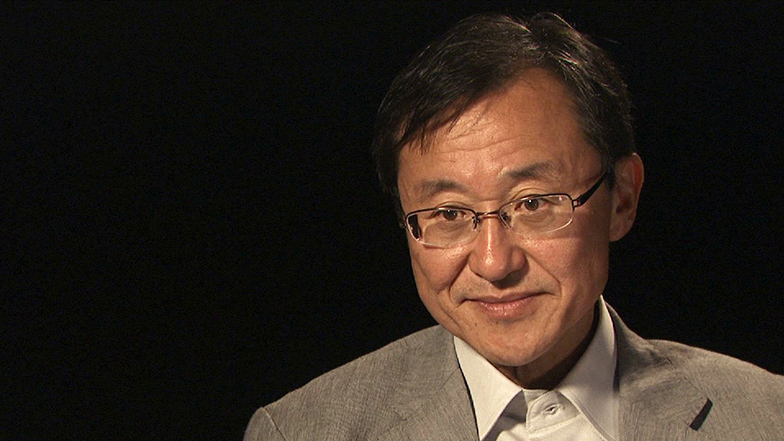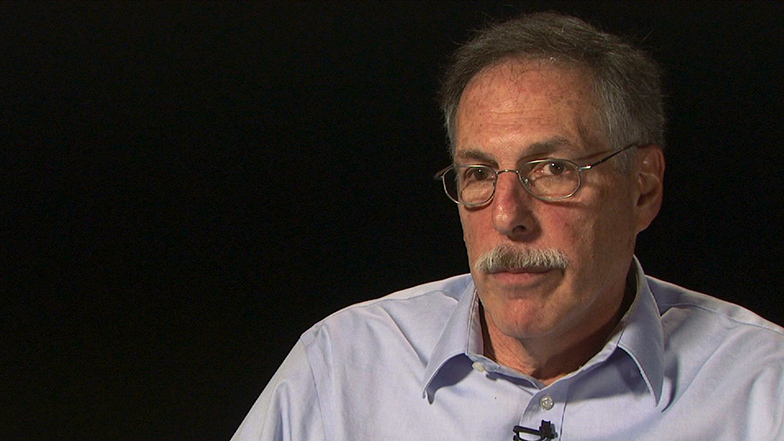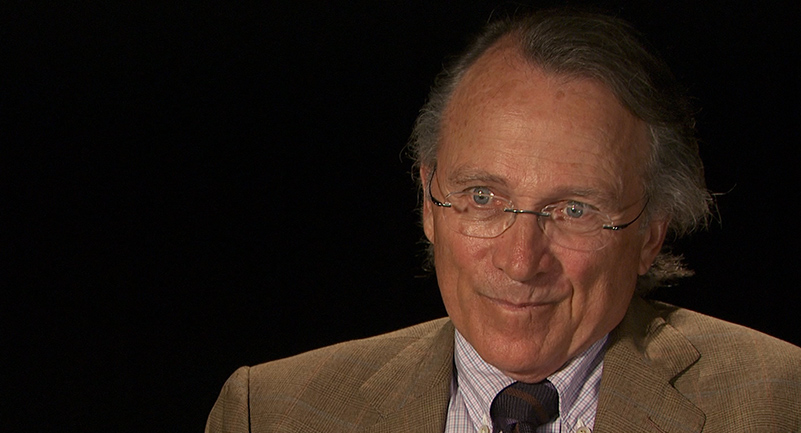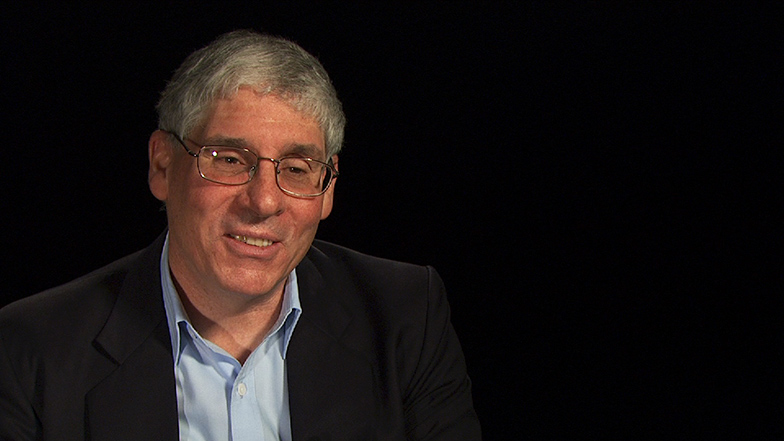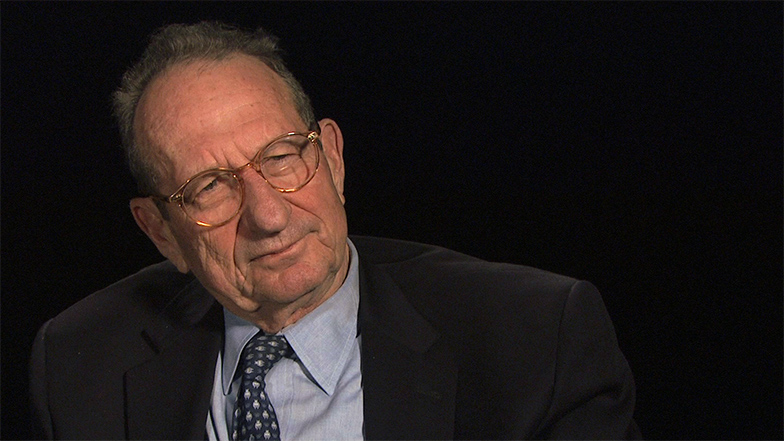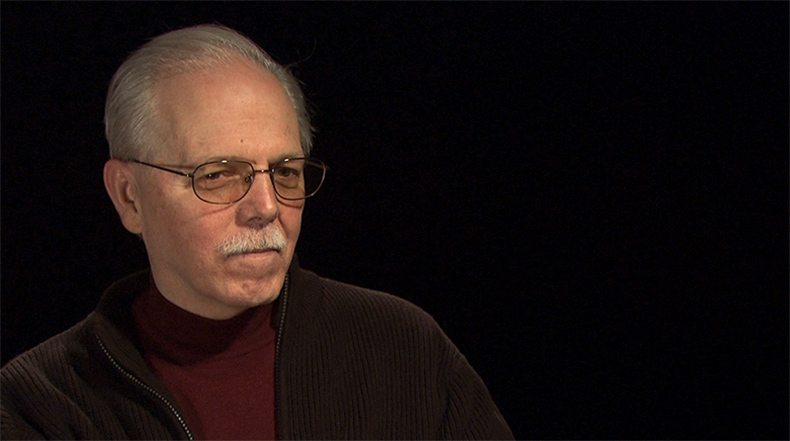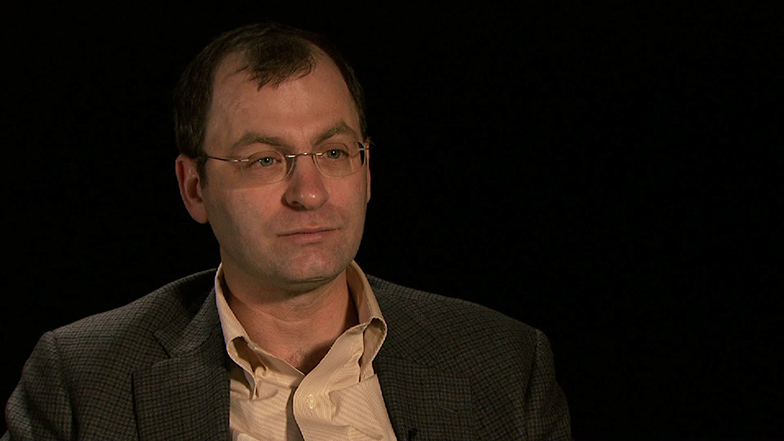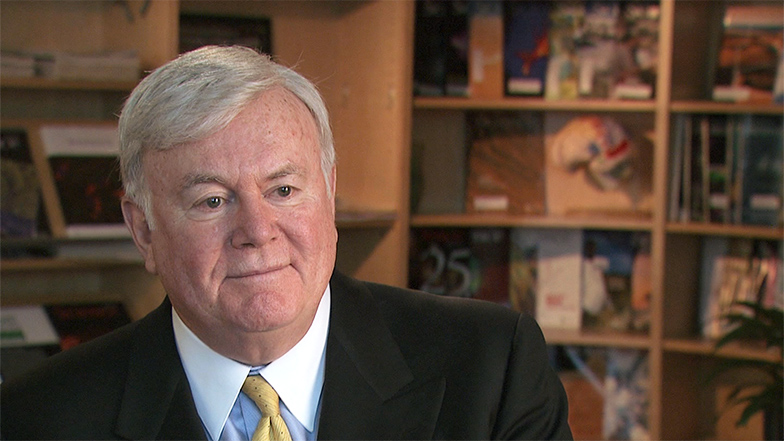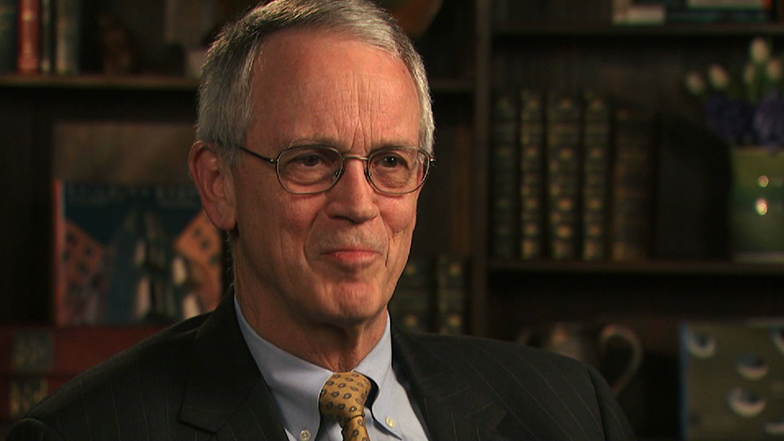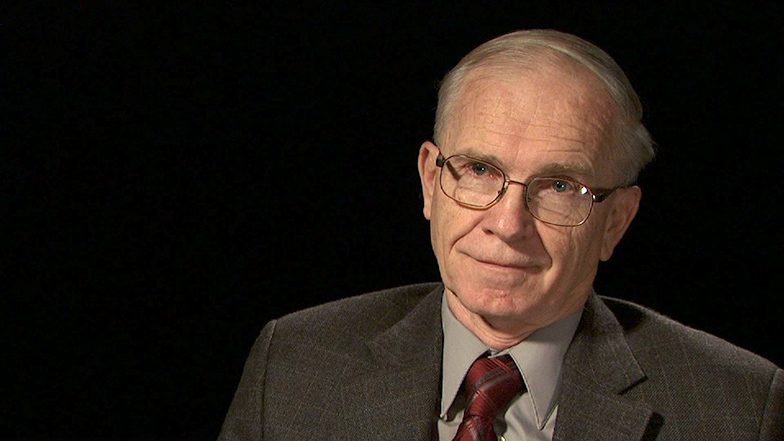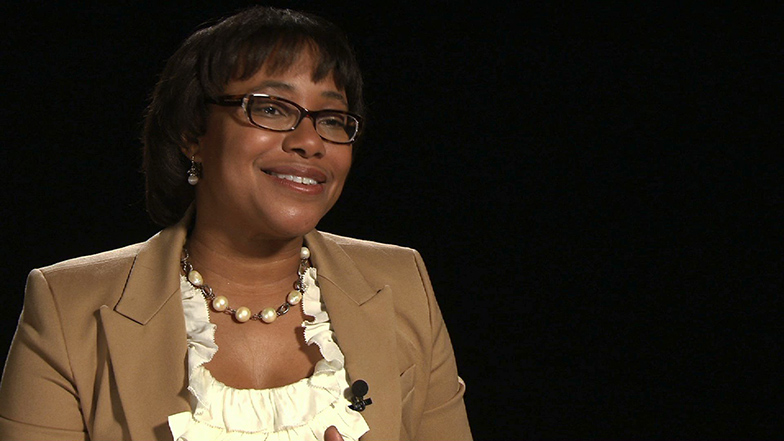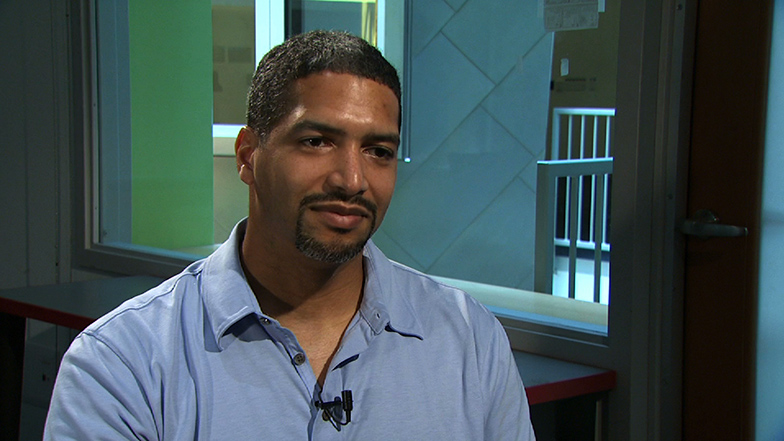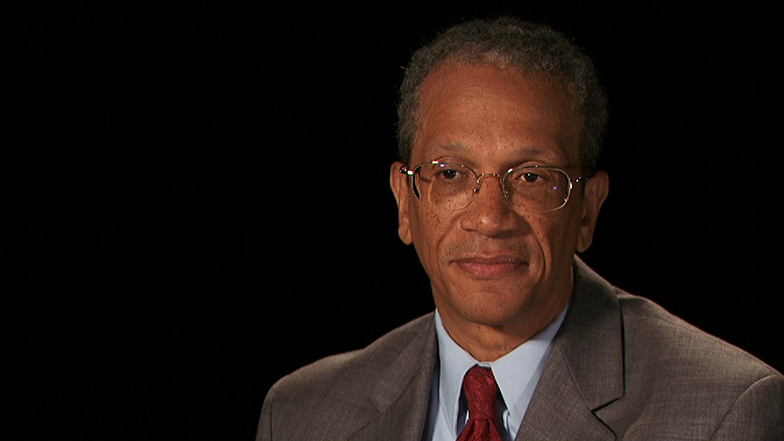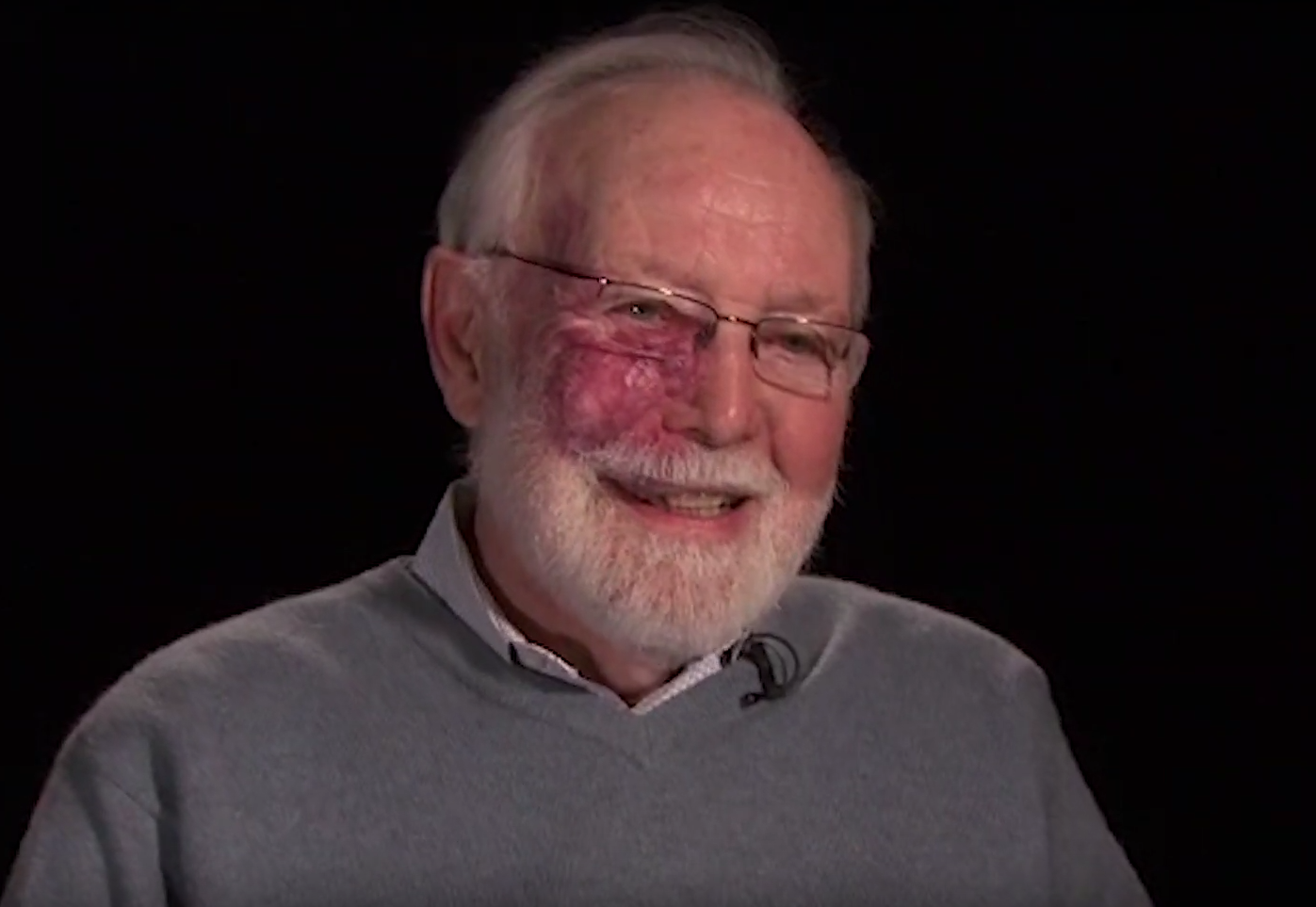Kathryn Willmore
INTERVIEWER: Today is May 18th, 2010. I am Karen Arenson. We're talking this afternoon with Kathryn Willmore, the vice president and secretary of the Corporation at MIT until her retirement in 2006. In 41 years at the Institute, she worked closely with five MIT presidents, from Howard Johnson to Susan Hockfield. Officially, she was responsible for external and internal communications, and the administration of MIT's governing board, and relations with MIT's trustees.
She was also confidante, sounding board, and adviser to MIT's senior leadership and increasingly, its institutional memory. She was a witness to, or participant in, most of the important decisions in MIT's modern history. Kathryn, thank you for talking with us today.
WILLMORE: My pleasure.
INTERVIEWER: You were a religion major from Mount Holyoke. How did you come to MIT?
WILLMORE: My husband, at the time, was a graduate student in biology here, and we had no money, and no car. Knowing how graduate student life was, we thought, well, if we're ever going to see each other, maybe I should work at MIT as well. I actually applied for, and accepted a position with the technology and culture seminar. That position was to start in the fall, but I needed a job for the summer.
What was then Personnel called me, and said there's a summer job in the dean's office of the Sloan School, with the Fellows in Africa program. Would you be interested? I said, sure. I'll do anything for the summer.
As it turned out, it was a really interesting program, and they had great people to work with. At the end of the summer, they said, would you just like to stay on, and work with us? I said, well, what would be the job? They said, well, we don't know, but we're sure that there'll be great and interesting things for you to do. I thought, well, I sort of like the organizational and administrative work that I was doing, and in technology and culture I'd be doing more editorial kinds of work. I signed on with the dean's office, and worked there for a year.
INTERVIEWER: Was it specifically about an African program, or was it a really wider portfolio of projects?
WILLMORE: The summer really was that. This was a program in which Master's graduates from Sloan would be sent for two years to work with the ministries of newly independent African governments. After two years, they had to leave. They couldn't recolonize the place. Every summer, they had a conference where the Fellows from the different countries would come together with faculty from Sloan to share their experiences, and reflect on what they've been doing. The summer was involved in helping to organize that conference.
After that, I had the opportunity to work with John McPhee for a little bit--
INTERVIEWER: The author?
WILLMORE: The great New Yorker writer who wanted to do a profile of one of the Fellows. I ended up writing mini profiles of several of the more interesting-- they were all interesting folks-- and then he picked one, but in the process, I actually got to work with him a little bit. That was a real treat.
Then I did whatever people wanted. The Hermann Building had just been built, and half the economics faculty was moving from Sloan into the Hermann Building. They said, we want you to orchestrate that move. No one told me about space wars, and how coveted every inch of space was, so I said, sure, I'd do that. Here I was, 21 years old, bossing around moving crews and telling tenured professors where to go. I had no idea. I had no idea. It was that kind of thing-- whatever sort of special project needed to be done, they would toss my way, and I'd do it.
INTERVIEWER: Did you think at any point, where is this headed? What kind of career am I going to have if I keep doing this, or did you have career plans when you entered college and chose to major in philosophy and religion?
WILLMORE: It was the beginning of the 1960s, and so I did not have a specific idea of a career. I wanted to go to a women's college-- that's why I chose Mount Holyoke. I really wanted to be able to focus on my studies, and sort of be my own agent in a way. I found in high school that so many of the girls were deferring, socially and intellectually, to the guys, so I thought, well, in a women's college, that's not going to happen, and it didn't.
That's why I went to Mount Holyoke, and I chose philosophy and religion because of my own background. My parents-- who had both left their respective churches as teenagers themselves-- came from very disparate backgrounds. My mother was raised as a Christian Scientist, and my father was raised as a Mormon. You cannot get further apart on the Christian spectrum. They didn't go to their churches, but they wanted to make sure that we had some religious upbringing, so they sent us to this fire and brimstone Scottish Presbyterian Church. I was scared to death of the minister.
I kept thinking, what is this all about, and why aren't they--? We would go, and my dad would drive us to Sunday School, and we would listen to the Mormon Tabernacle Choir on the radio while we went to the Presbyterian church. When we moved from St. Louis-- which is where I grew up-- to Boston, then we started going to the Congregational Church. I just thought, what is real here? I mean, people seem to choose this or that-- what is real? So I thought during college this is an opportunity to explore that. It was with no idea of entering the ministry, or anything like that.
INTERVIEWER: Or of a career?
WILLMORE: No.
INTERVIEWER: Once you landed at MIT and started doing these projects, a career was still a far away thought? It was just interesting at the time?
WILLMORE: Career was not so far away, because I knew I would have to be working at least for some time. At Mount Holyoke, we were always told we were uncommon women. When I got to MIT, I realized how uncommon women were. In this setting, there were-- I think, maybe, 3 percent of the students were women, and no more than that on the faculty.
In the administration, women were either librarians, or secretaries, so I was sort of this odd person that didn't fit into those slots. I had been told early on-- probably by Personnel-- that I would be lucky if I ever became an administrative assistant, if I ever rose to that exhaulted level. I thought to myself, well, we'll see. I thought, there's more.
INTERVIEWER: You didn't say, let's run away-- that's a horrible attitude.
WILLMORE: No, because I had started to get to know Constantine Simonides-- who was the assistant dean in the Sloan School at the time-- was very interesting and challenging. He was the one who would give me these odd assignments, and I thought, well, it's a challenging, interesting thing, so we'll just sort of see where it goes. It was sort of like landing on Oz in many ways, because Holyoke was a small liberal arts college-- a women's college-- and suddenly here I was in this major research university, focused on science and engineering and basically white male. It was very much an engineering and science culture, so it was a very, very different world.
INTERVIEWER: In your first year at Sloan, how much did you get a sense of that science and engineering culture, and how much were you in a silo that was pretty isolated, that the management school really was an entity unto itself?
WILLMORE: It was clear that Sloan was apart in many ways. In later years, it really became much more integrated with the rest of the Institute. My sense of MIT as a science place came through my husband, who was getting a doctorate in biology. Lots of our friends were in the sciences. I started getting a sense of what the culture of science was through that, through that route.
INTERVIEWER: How did you and Constantine make the leap into the central administration?
WILLMORE: At the end of that year-- or close to the end-- Howard was named president of MIT, much to everyone's surprise, including his own. He took a few people with him to start forming the president's office, and I was lucky enough to be part of that little small team.
INTERVIEWER: He actually had left briefly, I think, and had accepted--
WILLMORE: He had. He had accepted a job with Federated Department Stores in Ohio. They had sold their house. I think Betty and the kids had already moved there, and Howard was back and forth.
INTERVIEWER: Did you have a few minutes of wondering whether you were still going to be employed, or who your new boss was going to be?
WILLMORE: Actually, I had quit. That was another part. At the end of that academic year-- that first year-- Don's lab, the whole lab, was moving to Wood's Hole for the summer. I thought, well, I don't want to be stuck in Boston by myself for the summer. I had no idea you could ask for a leave of absence, so I said, I'm sorry, I have to quit. This was before I knew of really all the ramifications of what was going on the higher administration, so they said, oh, OK.
Then while I was in Wood's Hole, working actually for the National Research Council for the summer, I got a call-- probably from Constantine, saying, would you come back, and be part of the president's office? I got a call from Bill Pounds, who had been named dean, saying would you come back, and be part of the dean's office? With all the arrogance of a then 22 year old, I thought, well I've done the Sloan School, so I might as well join the president's office. I knew nothing, but I was just very lucky to be in a good place at that time.
INTERVIEWER: What were the jobs that you took on when you moved in September?
WILLMORE: That's when I started really doing a lot of writing, and I actually did some speech drafting early on. I kept track of trends in sort of federal legislation that would affect higher education, and sort of anything else, again. More and more, I started either focusing on communications, or utilizing my writing skills to help organize other activities.
INTERVIEWER: How aware of what a good writer you were were you when you were going through college? In other words, did you get all A's on your papers, or get told by your professors that, gee, whiz, you're so much better than others?
WILLMORE: Not directly like that, but I would be given opportunities to meet writers, when they would pick a few people. The most exciting one was Eudora Welty. I was invited to tea with Eudora Welty. It was amazing.
I knew I was a good writer, but it was actually-- it's like anything else: practice, practice, practice. Constantine was a very good writer, and he always used a fountain pen. He had one that had red ink. It was really like some of my drafts would come back bleeding to death, because there's different kinds of writing for different purposes. I really learned that from him, and just the refining, and redrafting, and really choosing the right way to say something for a particular purpose.
INTERVIEWER: What was Constantine's role in the president's office, especially in the beginning? Was he just sort of a jack of all trades, an assistant?
WILLMORE: He was assistant to the president at the time. Howard relied on him a lot to help orchestrate the business that came before the Academic Council. Early on, Howard was very much interested in bringing the different parts of MIT together. I don't know whether he expanded the Academic Council, but I know at that time you did have the deans of the schools and the vice presidents meeting together, which was very unusual.
It's still unusual for many institutions to have the administrative and academic leadership meeting together regularly. Howard felt that was really important. He'd started a faculty council-- like the department heads meeting together on a regular basis. I think he relied on that a lot during the times of campus protests and turmoil, so that the people who had influence and contact in the departments would feel more connected and informed and able to contribute to issues that were affecting the whole university.
Constantine played a very big role in keeping all of that going. I think through his whole career he was like the glue keeping administration and faculty and academic administration in touch with and engaged with each other.
INTERVIEWER: As a student who was here at the time, I always had the perception that he sort of knew everything that was going on everywhere. How did he manage that?
WILLMORE: He was phenomenally curious. He wanted to know everything about anybody he met. It was never a job for him-- it was his life. He loved MIT, and he loved engaging with people.
I can't remember exactly when it was, but someone came for a job interview, and came out two hours later sort of stunned-- 'I told this man things about myself I haven't told anybody!' He really wanted to and did get to know whoever he had occasion to work with, and he would keep putting people together.
INTERVIEWER: In the end, that was helpful to Howard as president.
WILLMORE: Yes. They both shared, I think, that inclination to really get to know the people, as well as the issues.
INTERVIEWER: Was that a style that you adopted as you went along, too?
WILLMORE: It was clear that it was a very effective way of working, of having an influence. There are lots of ways to be a leader, and one is to really get to know people, trust them, and have them trust you. I watched that, and witnessed, and took some of those lessons.
INTERVIEWER: So Howard Johnson was the first of five presidents you worked for whose presidency you saw up very close. On the face of it, the five presidents seem quite different from each other. Were there any similarities?
WILLMORE: I think an infatuation with MIT. All of them really loved the place in different ways. I know Susan was just in awe of the place at first. She sort of couldn't believe that she was called to be president of MIT. Howard couldn't believe that Jim Killian called him to come back from Ohio.
He could have gone into business, made a lot more money, and put theory into practice. As a matter of fact, when he came to MIT as president-- came back-- I think he put theory into practice in a way that no one could have imagined at the time. Every one of them love MIT.
INTERVIEWER: What you think it is about MIT that grabs people so strongly, when it grabs them? Do you think this is true of other institutions to the same extent?
WILLMORE: Well, now, you're talking to someone who's spent her entire life at MIT. Part of it is the energy: the energy and the intensity and the sense that you're doing something really important, and making a difference in the world, no matter what particular field or activity you're involved with. I think it's that intensity, and there's also something very down to earth about the place, still-- maybe not quite so much as it was in the old days.
MIT, in a way, is not proud. That sounds sort of odd, but I think it is that you make it here on your own merit, whether you're a faculty member or a student. You know having been a student here, there are no academic scholarships. You get in on your own talent. I think that's true for whoever works here, as well. There's not a lot of reliance on pedigree and that kind of thing. I think all of that feeds into people thinking that it's a very special place. Also, it is such an intense place to work, that you either love it or you couldn't do it.
INTERVIEWER: Did you ever see people come in and realize that, and say, oh, my, not for me, and run the other way, or did people pretty much understand that before they came?
WILLMORE: I've seen a couple-- people who really came from some place very different, and actually a different kind of sector, a non-academic. I think maybe thinking they were coming into it as some kind of easy, laid back lifestyle, and that was a shock. Also, I think people who come from a non-academic background don't understand that we don't operate with this top down hierarchy. No one tells a faculty member what to do, so you have a thousand-- if you're in the administration, you have a thousand bosses. You're not telling them, you're serving them.
INTERVIEWER: You mentioned the feeling of doing something important. Some of that probably came from being part of a university that educates young people, but that would be true then of most universities. Is there something more-- a sense of MIT's role in the world, or in society-- that somehow makes it different from other universities, like the sense of importance and service?
WILLMORE: I think the founding principal really of bringing science and technology and related fields to bear on the needs of society-- that was a different way of beginning than many universities, which really followed on the European tradition. That was more knowledge for its' own sake, which is all very good, but MIT started with this different idea of serving the needs of this newly industrializing society.
There's always this sort of practical bent to almost everything that was done here. Rogers used to speak about the dignity of useful work, and that's different than many other universities as a founding principle. You're sort of aware of some of the things that MIT had done, as I was, in the world-- World War II, the contribution to the development of radar, those kinds of things-- touching the currents of history in a major way.
Later on, there was molecular biology developing here, and seeing how that really has transformed the world, and the same with computer science. We start thinking about the sciences and technologies that have touched so much of society, or the world, and a lot of it happened here in its genesis.
INTERVIEWER: Do you think that sense of specialness still exists as much today as it did when you first came?
WILLMORE: I would guess not quite as much. In some ways, MIT has grown up into being this major international research university, and it shares a lot of the characteristics of other places like Stanford or Harvard or Princeton. I think maybe not quite as much, but still, when people come here from different places, the intensity of the place-- they always comment on that. I think that may still be unique.
INTERVIEWER: Let's go back to talking about the five presidents and their offices. Let's start with Howard Johnson. What was MIT like when he became president, and how much had it changed by the end of his tenure?
WILLMORE: It was like pretty much when I first came. It was still very much focused on engineering and science. We did have architecture and management and humanities and social sciences-- the other schools. They were much more in service -- not architecture so much, but the others-- more in service to engineering and science. I'm trying to think-- science, we may have had more science students than engineering. I'm not sure-- there was a shift, and maybe it was at the graduate level in the mid 1970s when it sort of switched over.
INTERVIEWER: They were both predominant then and now.
WILLMORE: Very much. One of Howard's interests was in trying to bring the other schools and fields more to bear on the core of MIT education. In fact, that was one of the reasons why he appointed the commission on MIT education, which was in 1969, I believe. That was a group of faculty and students who were asked to review the educational programs, the research programs, and the governance, and make recommendations for what kind of place MIT should be for the future.
Interestingly, their underlying conclusion was really to bring all these fields together and to bring in especially the humanities, the arts, and the social sciences into the core education of students much more than it had been. I was working--
INTERVIEWER: It was part of the general Institute--
WILLMORE: It was, by then, certainly, but it was not integrated in the same way, or regarded in the same way.
INTERVIEWER: How did he do that, or how did MIT do that? Was there any particular vehicle?
WILLMORE: I'd say, given the times-- the report was issued, and its title was Knowledge and Wisdom. They wanted to bring wisdom more into the core. Unfortunately, given the times, the whole report was -- sat more on a shelf. There were just so many more pressing things--
INTERVIEWER: But he tried.
WILLMORE: The fact of people coming together in the midst of all of this political activity and turmoil on campus, and sitting down and talking about these issues and really caring about these issues. Some of those same people would then be also out marching, and that was very interesting that they would just play both roles.
[INTERPOSING VOICES]
INTERVIEWER: That was, of course, the period when Howard Johnson's office got taken over and occupied by students. There were some very strong protests. What were those campus turmoil years like for you, especially since you were in that office, or connected to it?
WILLMORE: It was a little schizophrenic. I was still married at the time, and my graduate student husband was one of the people out on the street. I had to still be part of the administration and not confuse my role, so to speak, because I was very sympathetic to the purpose-- not necessarily the means-- of the protests.
INTERVIEWER: Were you ever scared when you were--?
WILLMORE: No, because there wasn't violence. There was a lot of noise. You could say using a battering ram to break down a door is somewhat violent but I never felt personally afraid.
INTERVIEWER: Were they the hardest years you experienced at MIT, or the worst in any way?
WILLMORE: Not at all. They were so interesting. As I said, you had people out protesting and coming and sitting down and sharing their dreams of what MIT could be. What was really interesting in that was that they really cared about the institution and the role it could play in society. People still cared about the place. You had faculty, students, and administration arguing deeply with each other, but around visions of the institution. If anything, these days, people are more focused on their own fields, and less on the community.
INTERVIEWER: Paul Gray and Howard Johnson certainly talked in later years about the pain they felt in sort of defending the institution that they saw others trying to tear apart, and even 20 to 30 years later, I think they were pained by it.
WILLMORE: Absolutely. I think maybe even particularly Paul, who had started here as a freshman. I'm not saying it was easy years. For me, from my perspective, it was a different thing. I was not so imbued with the mission of MIT in the way that may have occurred later.
INTERVIEWER: Did you see Howard change as he faced the turmoil of the campus protests over the years? He probably stepped down earlier than he might have otherwise, and that he suggested it. As you watched his management style, or his way of coping--
WILLMORE: I think his management style, that was what brought MIT through. It was his values, not just his style. He really believed that people could work through this together. He believed deeply in the value of MIT to society. He recognized that there were problems that needed to be addressed, and he would seek out people to talk with.
INTERVIEWER: Such as?
WILLMORE: Students and faculty who might really hold very different political views. He really wanted to understand and find ways through, so that people could move ahead together. That took a tremendous, tremendous toll. It was unending-- 24-7. Five years is a long time to sustain that.
INTERVIEWER: Were you writing speeches for him then at all?
WILLMORE: I did some.
INTERVIEWER: Any that dealt with these issues, or were they on other topics? I just wonder how hard it was to articulate positions in the midst of all this.
WILLMORE: On those topics? Probably not. A lot of that was that you just do it in the moment, or he just did it in the moment.
INTERVIEWER: Do you remember dealing with alumni at all during that period, or trustees?
WILLMORE: I didn't at that time. Remember, I was still a little kid at the time. Constantine did.
INTERVIEWER: Uhhuh. Did he ever talk about it? And how difficult it was relating the--
WILLMORE: Well he really relished it.
[INTERPOSING VOICES]
He did. He did. Again, he loved being in the middle of the action. He just loved it. So even though it was really hard, he really loved it, and he loved engaging people to a higher purpose, basically.
INTERVIEWER: Given the stress of that period and the bitterness involved, were you surprised that Howard Johnson remained so involved with the Institute for the rest of his life?
WILLMORE: Not at all. It was the thing that enabled him to hold the institution together, because he held it so dearly. While it was very, very difficult those five years, I think he couldn't possibly have walked away, because everything he did was guided by how much he cared for the place.
INTERVIEWER: When he stepped down as president and Jerry Wiesner took over, did you have any questions about whether you were going to stay in the president's office or move on to something else?
WILLMORE: Well any time there's a change in administration you think, well, you know, this may be it. I was working really directly for Constantine in those years. And once it became clear that Jerry wanted Constantine to stay on, then I knew I had a job.
INTERVIEWER: Did Jerry use Constantine in the same ways that Howard did?
WILLMORE: In some of the same ways, yes. Although I think Jerry had Walter Rosenblith as his provost, and they were just like such great intellectual partners and visionaries. And I think he relied, in terms of vision of the place, and what he wanted to do, really a lot on Walter.
And things had sort of settled down enough that he didn't have to do a lot of the managing of the place. And then he had Paul Gray, who had been named Chancellor, which was a new iteration of that position. Hadn't had a chancellor for quite sometime.
And so Paul's responsibilities really were sort of the internal running of the place. And Jerry and Walter really were out there with their eyes on the horizon, or maybe even painting the horizon.
INTERVIEWER: And what kinds of things was Constantine doing then? And what were you doing then, during these years?
WILLMORE: Constantine continued to orchestrate the flow of issues in business among the different councils, and between the faculty, and the administration, and the trustees, although he didn't have a formal role with the trustees at that time. But again, he was always weaving issues together.
For much of that time, during Jerry's-- maybe all of the time during Jerry's presidency-- I was a member of the Analytical Studies and Planning Group, which was an internal study group that was part of the larger president's office. We would be given questions to explore or tasks to do.
We did a major survey of MIT alumni with a report that came out in the early to mid '70's, where we wanted to know what alumni were thinking about MIT now. What their experience had been, and how engaged or not engaged they were? And we were convinced by a consultant who worked with us not to start out with categories that we would slot answers into.
Everything was a very, very open ended interview. And then after the fact, we had to read every-- and these were hundreds of personal interviews-- after the fact then, we read everything and then started developing the categories. So instead of starting with the paradigm, we drew the categories out of what everyone had said.
It was very fun. That was like a 24 hour a day job, because we were telephoning people. Jerry had written this huge sample, and then we set up telephone appointments. So we started like 8 o'clock sometimes early in the morning, East Coast time, and didn't end until like 8 o'clock at night, sometimes later, West Coast time. We were just always on the phone.
INTERVIEWER: So you were doing actual interviews?
WILLMORE: Yes. We hired people also to do some of the interviews. David Wiley and I were partners in this scheme. And we did a lot of them to begin with so we got a feel, and--
INTERVIEWER: Do you remember being surprised by any of the interviews or the answers? Or were they somehow predictable?
WILLMORE: Well, I was surprised at some of the resentment of MIT among graduates who had recently graduated, and how that shifted over time as people began to appreciate what MIT had provided to them. And so, by the time they were 50 years out, they loved the place. But five years out, well, they weren't so sure. And so that shift in attitude--
INTERVIEWER: How much did the Vietnam War experience color what kinds of answers you were getting?
WILLMORE: Well it did. Again some of the younger ones were right on the edge of it while they were students. And so they had a very, much more ambivalent feeling. Some of the very older ones couldn't understand at all why anyone would behave that way. So yes, it did.
INTERVIEWER: But you couldn't explain, I assume? You were just asking questions?
WILLMORE: Yes. We couldn't defend it or offer any context. We just had to listen and write like mad.
INTERVIEWER: This was before computers. I mean before small desktop--
WILLMORE: Yes. Yes. And then we would take all these notes. And we then hired a group of young people, mainly graduate students and some others, and we had this big room next to our offices that had been a lab, and had been totally gutted, because it was going to be used for something else. And we just set up all these carrels in there for the coding to go on.
And our offices were very nice. And the offices next door, or this space, were pretty rough. And after awhile, the people in the lab space started referring to our offices as the Hilton and their space as the swamp. And suddenly there got to be this whole dynamic going on between the Hilton and the swamp.
And then we had a big rebellion because after we had pulled out what categories we wanted to sort these responses into, they said, you can't do that. You cannot chop these people into little pieces and put them in little boxes. You just can't do this. So then we had to have huge meetings to explain why, yes, we could. We had to or none of it would make any sense to anyone.
INTERVIEWER: Do you think the results of the survey shaped the direction that Jerry Wiesner lead the Institute in after that in anyway?
WILLMORE: I think it helped inform more how we were going to approach alumni relations, and also resource development. It was clear we didn't have a uniform alumni body. They were very different in different generations, and had different concerns and different attitudes toward MIT, and valued it differently at different points. So I think in that way it did.
INTERVIEWER: One area that Jerry Wiesner really championed, while he was president, was the arts at MIT. Do you recall how that came about, and what he did?
WILLMORE: Well, I know he worked with Kay Stratton, who's husband, Jay, had been president right before Howard Johnson. And Kay had always been very, very much interested in the arts, even while Jay was president. But I think he saw a great resource there. And think I'm right on this. They worked together to create what is now the Council in the Arts for MIT. But it was a group--
INTERVIEWER: Which I think he set up around '73.
WILLMORE: Yes. And they identified some like-minded people outside the Institute who would be willing to share both their vision and their dollars to help us get this started. And one of those visionaries was Margaret McDermott. Now McDermott Court, where the Green Building is, was given by the McDermotts. And Margaret and Kay became great co-conspirators for the arts at MIT. And they just kept drawing people in and working with the faculty.
Again, always it comes from the faculty, but it needs some central support if--
INTERVIEWER: Did you continue to work with those two women in the years that followed?
WILLMORE: I didn't. In fact, I didn't really get to know Kay until much later. But I always wanted to be like her when I grew up. And I still do. She's 92 years old. And Margaret McDermott now is 94. And she came, just last month, to the Institute for the first time in quite a while-- she lives in Texas-- for the presentation of the McDermott Award in the Arts.
INTERVIEWER: To Dudamel. The conductor.
WILLMORE: Yes. Gustavo Dudamel. Which was a fabulous event, where this just extraordinary young conductor was working with the MIT Symphony Orchestra. But Kay had planned a small dinner to honor him and bring some of the leaders in the arts together for that.
And the two of them-- I had not met Margaret McDermott before this, and she was just as sharp as Kay. They're just extraordinary women. She kept saying, well I'm older than you are, even older. But they were just like two peas in a pod, and just orchestrating the conversation around the table. I mean Kay had planned the menu, the conversation, the guests, everything. And if you think, at 92, she brings a group of dynamic people together, think how it was 40 years ago when she could do that.
INTERVIEWER: Were there any other particularly interesting projects that you worked on in the president's office during the Wiesner presidency that stick out in your mind?
WILLMORE: Well this alumni survey is the thing that really sticks out.
Well, you know what else I did? That was when I started working with faculty committees.
I was staff to the chair of the Faculty and of the Committee on Educational Policy, which was the senior faculty committee at the time. And that's when I really got to know faculty members, because there would be a turnover over the years, but I got to work not only with the chairs, but I was in weekly meetings with all of those. And it was one the best educations I ever had in terms of MIT and academic culture. It was great.
INTERVIEWER: Did anything surprise you about those committee meetings as you started going into them?
WILLMORE: No. The faculty weren't gods. They were real people. And again, down to earth. When I said earlier that MIT's such a down to earth place, they were just really interested in educational policy, shaping it, coming from many, many different departments. It's one of the great ways in which you knit an institution together, I think is by having councils or committees where people from different venues come together and see what they have in common, what they care about in common.
INTERVIEWER: If you took a committee like the educational policy one, how many of them really wanted to be there and were truly interested in discussing issues of educational policy every week or two? And how many of them were doing it out of a sense of duty?
WILLMORE: Well we fed them lunch. So that always helps. But that committee, people, if there was one committee that they wanted to be on, that was it. So it wasn't hard to get faculty.
INTERVIEWER: Do remember, off hand, any of the issues that came up during those years? Any that seem like they were particularly divisive or important in the way they were handled?
WILLMORE: A lot of the time we were talking about the academic administrative interface, even though that wasn't really educational policy, UROP was still a very young institution, so how that was going to really take hold.
We were dealing with the report of the commission on MIT education, so that was very interesting, but it was just wasn't clear at the time.
There had been a recommendation for a first division, sort of a college within the college for the first two years, which did not happen. But which would have brought more of the threads from all the university together in that first year or two. But the dean for undergraduate education, that position, grew out of that work.
So it was trying to figure out how to take what people embraced from the report and move it forward. Although there were a lot of things, it was just too difficult a time to keep a sustained attention on that, I think.
INTERVIEWER: As the Wiesner presidency came to an end, and Paul Gray succeeded him, once again, were you still working for Constantine at that time?
WILLMORE: I was. He was a great mentor. And since I was always being given new opportunities, I thought, well I'll just keep doing this.
INTERVIEWER: In the office you were in, how big was that office?
WILLMORE: The ASPG, the Analytical Studies and Planning Group, there were about five of us.
INTERVIEWER: All at the same level essentially? Are any of the others still--?
WILLMORE: No. One went on to found an HMO in upstate New York. David Wiley became registrar for a while. Allen Cranmer I don't know what he's doing.
INTERVIEWER: So you were doing the work of that office, but you were also taking on projects for Constantine and for the president?
WILLMORE: Right. Right. But then with that change, when Paul-- Oh, I know. I was taking on management responsibilities during those Wiesner years. I forgot about that. That's when that started. For the, what we called Campus Information Services, there was the information center, the international scholars office, office of design services, not the news offfice at the time, but practically everything else that now makes up public relations services.
Constantine said we need someone to manage that. And you can just add that, and it won't take that much time.
INTERVIEWER: Did you develop any kind of strategic plan when you took on the campus communications? Or think about how to shape them? Or try to do things differently?
WILLMORE: Not at first. I think this is one of Constantine's tricks. Here's an area that needs some attention. It will maybe take 5 percent of your time in addition to the ASPG work. And I don't know why I kept believing him all these years as he said just take this on. But I did.
And so that was my first line management set of responsibilities. And I had to get used to just doing that at first. And then, as I became comfortable in that role, I begin to see things that-- I mean partly-- One of the things we were responsible for was publishing the catalog. That's how you got the word out about MIT to prospective students those days, was publish this giant catalog, which I'm sure you remember.
And one of the things that sort of frustrated me and others, at the time, was that we had very few women applying to MIT because no one thought there were any women there, even though there had been growth in that. And certainly, Jerry Wiesner and Paul Gray, together, had really worked on increasing the number of women students. But outside MIT, no one saw MIT as a place where women would go or aspire to.
So I started weighting the photographs in the catalog and on the cover to include more women than there were proportionally in the student body, just because I wanted to break through the stereotype. And I got more than a handful of complaints from alums, who wanted to know what all these women were doing at MIT.
INTERVIEWER: What did you say to them?
WILLMORE: Just what I said to you.
INTERVIEWER: You told them the truth? And their reaction then?
WILLMORE: Well. Well. Well. Well, then what would they say? So.
INTERVIEWER: And Jerry Wiesner, and then later, Paul, were behind this? Or did they not even-- were they aware of it?
WILLMORE: They certainly may have been marginally aware at the time. So we would do things like that to try to make MIT seem less focused only on science and engineering, and only on men, as part of what we were doing in terms of outreach, and trying to shift the external image of the Institute.
INTERVIEWER: Did you think about that in terms of MIT's image in areas other than science and engineering and technology? Say in the humanities or the arts? Any interesting efforts on that front?
WILLMORE: No. More just how we talked about the place. It was a huge effort, and that was not more on the humanities, but again on the gender issues, where we started getting rid of the generic male reference, and using his or her, and using ms.
I remember one chair of the Faculty, in a set of notes that I'd written, said what is this manuscript Smith. I said, it's not manuscript Smith, it's Ms. Smith. So what's that?
There were all these little things at the time. Sort of telling little moments. But there were people that would push back. Why do you have to change the language? If you were a man at the time, it just it wasn't an issue. And more and more--
INTERVIEWER: But you were both conscious of it, and you felt comfortable making these moves? You didn't worry about anyone pulling the rug out from under you? You figured they'd defend you if it came to that? So when Paul Gray took over as president, you had worked with him fairly closely by then. I think your role changed yet again?
WILLMORE: It did. He asked if I would work directly with him as executive assistant to the president, which was the role that Jim Killian had had in relation to K. T. Compton.
And again, it was one of these positions that really weren't so carefully defined, but there was a lot that needed to be done. And I said I would do it as long as I can keep my management responsibilities because I was really enjoying that part. So he said well let's see how it goes. And because my management responsibilities had to do with communications, both externally and internally, it fit very well. Because so much of what a president does is communicate vision or explain issues or whatever it might be. But it's communications. So the two, I had all the resources to help that happen, so it actually worked very well together.
INTERVIEWER: What were the big challenges of the '80's, during the Paul Gray years? What did MIT face at that point, and what did he do?
WILLMORE: Well there was a whole export control issue at the time, where the Federal government was concerned that we might be giving away important secrets by either educating young people from other countries, who would go back and steal our thunder or sharing research results. There was some real push back on open publishing of research in certain fields. And that was a really critical issue.
And Paul was very outspoken on the importance of keeping the university open, and keeping academic publishing open, and not restricting it. Trying to make the case that science especially, but science and engineering, one discovery builds on a previous one. And if you can't share that, if you don't know what other people are doing, you're stopping the whole process of invention and discovery.
INTERVIEWER: Paul also seemed very deeply engaged with the issues of undergraduate education. He cared deeply. Were you involved in those aspects of what he was doing? What do you think were the important steps? I think he supported UROP actively but that was really from the late '60's and early '70's.
WILLMORE: Right, that was earlier on, and he continued to do that. My role there was more, again, in communications, and talking about the importance of teaching and of keeping the quality of the students high, in order to keep the best faculty. He always used to say that the faculty and students are both sides of the same coin. Students come because of really excellent faculty, but faculty come because of really outstanding students. And so he tried to keep fostering an understanding of that and support for that. He was very much interested and devoted to the community of MIT.
After the turmoil of Vietnam-- and that went on into the Wiesner years for a while, and there was a lot of experimentation, educationally, research, and new organizational forms that Jerry and Walter were really interested in pursuing. And I think during Paul's time, internally, it was a period of consolidating, settling, moving forward from the base, not inventing lots and lots of new directions.
INTERVIEWER: It was some financial tightness during those years?
WILLMORE: And there were financial things. One of the things I worked on there was trying to explain MIT's finances. It was really hard. Paul was really good at it. And he really got a handle on it as chancellor. I think he was a master at helping the Institute community understand better how our finances work, and why things were getting out of balance. And we just couldn't keep doing everything in the same way, and expect, somehow, the budget was going to get balanced. So that was it that was a big challenge.
So there were things like that inside, and then things like export control outside.
And then he also pushed a lot for increasing the diversity of the student body. And I think building on work that he and Jerry had started really, but he really pushed on that quite a bit as well.
INTERVIEWER: How did he proceed? What did he do?
WILLMORE: Well. He talked. Again a lot of it is exerting leadership through putting your vision out.
INTERVIEWER: Speeches that you ended up writing? Or helping him write?
WILLMORE: Yeah. By then, I worked a lot directly on presidential communications, which included speeches. But I never said I wrote speeches. I would, maybe, work with the president on speeches.
INTERVIEWER: Any that seemed really important in hindsight, that changed anything or that laid out something in a new way?
WILLMORE: There were so many. Some things become a blur.
INTERVIEWER: And he was successful in the diversification efforts?
WILLMORE: Things really did keep improving, and there may have been things that he did that I didn't see to keep that marching on.
INTERVIEWER: So for the first three presidencies, you worked in, all three of them had been on campus before they took over. Chuck came from the outside. What was that like? And did you know whether you'd stay on there, or you sort of held your breath again?
WILLMORE: Because then I wasn't just working for one person, I was working for two, and I thought, well I could continue with my management responsibilities, but who knows what would happen with this new person coming in.
But one of my roles was to help introduce the new president to how we were going to introduce him to the MIT community, and all that. But it was not at all clear that he would choose me to be his chief assistant.
INTERVIEWER: How did you introduce him to the community? What kind of a plan did you have?
WILLMORE: It was all so orchestrated, because no one could know before the Corporation met, even though the Corporation had to know who the person was. So it was, in one way, the literal introduction was a very choreographed day, where he just went from one meeting, to another, to another, to another with press coming in at certain points. And I just tried to be right there helping him understand, OK, here's the next step. These are the people that you're going to be meeting on that ground.
INTERVIEWER: Did you put together a briefing book before the day?
WILLMORE: We did. We had lots and lots of materials for him. And then, it was a question-- Constantine was still there as well, so it was a question of introducing him to key faculty and administrators around MIT. And then, he, on his own, said, I want to talk to as many faculty, in as many parts of the Institute, as possible. And I want to take the pulse, see what the concerns, see what the wishes are, what the visions are, before I say what I think MIT should be for the future. So he spent the entire summer going back and forth from Cambridge and Michigan, spending hours every day he was here talking with different faculty.
INTERVIEWER: Do you remember your first impressions of him?
WILLMORE: Someone who was very tall. And I always thought of myself as a tall person, but he's really tall. A very gentle manner. Very respectful of everyone around him. He had been tapped for this really extraordinary position. But there has never been any hubris in Chuck Vest. Not an ounce.
INTERVIEWER: He hadn't been in that office very long when there was a major issue, crisis, with the federal anti trust suit against MIT and a bunch of the Ivys. Were you involved in the handling of that issue?
WILLMORE: I was involved in the communications side again. This was what came to be known as the overlap suit.
Prior to that time, MIT and the Ivys, and I think Stanford, would meet each early spring to see which students who had applied to more than one of them had been admitted to more than one. And then they shared the information on the financial circumstances of those applicants so that they could make whatever decision that they wanted to make in terms of offering financial aid, if that was to be offered. But it would all be made on the basis of the same information, because they wanted to avoid getting into bidding wars for students. So the total amount of aid would be roughly the same, but the mix of how much loan, how much grant, could vary from school to school.
But they didn't want schools to start buying the students that they wanted most, but really, have the student's financial circumstances be treated basically the same. And the justice department called it price fixing.
INTERVIEWER: Where did the news come in first? MIT didn't have an in house counsel, so did they call the president's office?
WILLMORE: Yes. They did.
INTERVIEWER: And Chuck said-- We need to swing into action?
WILLMORE: Right. Well he first had to understand what the issue was. And Constantine again took the lead working with-- we had extraordinary counsel. We used Palmer and Dodge for working with us on lots of the really critical issues. And we turned to them. And they, of course, had to educate themselves really quickly, as well.
But after understanding what the issues were and what's at stake, Chuck said, this isn't right. We have to push back. Every one of the other schools said, OK, we won't do this. We'll follow the injunction. And Chuck said it's not right.
INTERVIEWER: Was Constantine surprised? Do you remember?
WILLMORE: I don't think so.
INTERVIEWER: Or was there much push back within MIT to say, how can he do that?
WILLMORE: I think probably there were some members of the Executive Committee who said are you sure? Should we be doing this? But Chuck was totally firm on this. He said, this is a matter of equity, of providing financial aid to those who really need it, not to those who we really want. And so he just held the course on that.
INTERVIEWER: Do you remember discussions internally before he went to the Corporation to say, here's what I have in mind. Will you back me? Was there much back and forth about what the Corporation was likely to say or do?
WILLMORE: Most of it would have been with the Executive Committee, which I didn't work with at the time. But that would be the most critical group of trustees.
INTERVIEWER: In the end, they certainly did back him?
WILLMORE: Absolutely. They did. It took a lot of explaining though, and the press never really got it, I think. But the principal was so simple. You provide the aid that they need, and don't just spend your financial aid funds to get students that you want, whether or not they need the aid.
INTERVIEWER: Chuck certainly had some major things to deal with in his years. I mean another was the horrible death of the freshman who drank too much at a fraternity party, I guess at a hazing ceremony. Where were you? You were still handling administration of communication at that point? What do you remember about how that came up and the thinking and talking about what to do? And the communications around it?
WILLMORE: Well when things like that would happen, we would pull together-- and often, it would be me who would pull together-- the people who would have knowledge about it or responsibility for acting on one aspect or another. At a moment's notice, we would pull together a group of anywhere from 5 to 15 people, depending on the issue. And certainly with the Scott Krueger issue we just pulled everyone together. Everyone from the dean's office to the chief of campus police, to someone from Palmer and Dodge, probably Jeff Swope.
I'm sure it was Jeff Swope, who was a very, very wise person. Still is.
INTERVIEWER: And did you and Chuck, or did Chuck go into those meetings knowing where he wanted to come out? or was it more a sense of let's figure out what we can do together?
WILLMORE: Well let's find out really what happened. Chuck was always very deliberative and consultative. So first you understand really what the issue is. What went on. What happened. And then start talk about what our response should be.
And as it turned out, Chuck, against all conventional wisdom, said I want to talk to that student's parents. And I want to personally apologize. You can't make it right.
But the conventional wisdom would be to distance the president, the university, as much as possible. Say, it was a fraternity. It wasn't on campus housing.
And Chuck really felt that freshman students shouldn't be living on their own without any adult presence anywhere. And he really felt MIT had a responsibility. And almost everyone said, oh my God, you can't say that. Every other university in the country will be sued and everything. And again, he said you have to do what's right. And he did.
And as it turned out, we settled with the family. He met with them personally, and they were not bitter about MIT. I mean, they could have gone on, and really made life miserable for years, and years, and years, fighting something in the courts and that kind of thing.
INTERVIEWER: So from a communications perspective, it really wasn't about what our image will be? It was more about what's right? And then, you had to figure out, how do we explain it?
WILLMORE: Right. Right. But with Chuck, it was always you knew you were on the side of the angels. It might be a difficult issue, but you were doing the right thing. So even though it was tough, it felt good.
INTERVIEWER: How quickly did all of you realize that the ripples from that death wouldn't go away quickly? Well in the end, he transformed, or it resulted in the transformation of freshman housing, and that had a lot of ramifications--
WILLMORE: It did, especially among
[INTERPOSING VOICES]
and so that was one thread that just kept going for years. I think people now understand it's OK for freshman to live on campus and then join a fraternity if they want later.
INTERVIEWER: Was that something you had anticipated?
WILLMORE: A push back? Oh, yeah. Because the fraternities are a very strong system. The alumni, I think, of fraternities and of athletic teams, maybe have the strongest ties, in a way. Because the fraternities were this smaller living group, so they were very, very close with each other, and maintain those ties. And the same, I think, with athletic teams.
So we knew that there would be a lot of unhappiness among the alums about that shift, and even among the students. A student can be here for one year and think, OK, this is the way it's always been and has to be that way forever.
So it took several generations of freshmen coming through for the ones who were then seniors to say, OK, this is the way it is. Because they hadn't had it one way and then change. So we knew that would take a long time. I think what to me, was a bit surprising at first, was Scott Krueger's picture in every newspaper and magazine in the country forever. I mean he was the poster child of this really serious, dangerous practice of binge drinking.
INTERVIEWER: Why do you think that was, given that there were so many other student drinking deaths year after year at other places?
WILLMORE: I think it was surprising that it was at MIT. He was this, apparently, clean cut, all American boy. You look at his picture, you think, oh my God, what a tragedy. Which it was. I mean there's nothing more horrible than losing a young person just at the beginning of their life, really.
So I think it was a juxtaposition of how could this happen at MIT? And then, if it happens at MIT, how more widespread it was?
So I think it triggered people's awareness around the country, but somehow because it was the trigger, he kept coming up over and over again. And you know how newspapers work. They have references, and so, if there's another similar death at another college, they go back, see if there's anything else, oh yes, MIT.
INTERVIEWER: If you and Chuck had known that at the time, do you think there's anything you could have, or should have done differently?
WILLMORE: I can't think of anything we could have done differently.
INTERVIEWER: Another emergency situation that occurred on Chuck's watch, although not centralized on MIT was the 9-11 attacks. What was that like?
WILLMORE: Well it was surreal, I think, for everyone in the country. I remember driving across the Mass Ave bridge, listening to NPR, and people saying it seems like a plane has crashed into one of the World Trade Center towers. And people were speculating, was it small plane? Got off course? What happened? So it took time for people to understand what had actually happened. And then, the enormity of it was just so shocking.
And we had to think, all right. What do we do for MIT?
Chuck Vest never took vacations, like trip away for a while. He was on vacation, in a boat in the middle of Lake Louise, in western Canada. He wasn't even in the country. The provost was at a conference in Santa Monica, California. OK. What do we do? So again, we pulled one of these groups together. We had the chancellor--
INTERVIEWER: Who at that point was Phil Clay?
WILLMORE: Larry Bacow I'm pretty sure. No. No. It was Phil.
INTERVIEWER: Who hadn't been in that job very long, I guess.
WILLMORE: Not at all. And John Curry who was vice president for finance, and the chair of the Faculty, and we got together and said OK, what we do? And I said--
INTERVIEWER: Were you able to reach the provost or the president?
WILLMORE: We were. They could not get back for several days. So we talked with them about what their concerns were, and how best to address it as a community.
There were spontaneous activities going on, faculty, and others. A vigil on the steps of the student center that afternoon. And I went over to that, and, at the end of it, asked several faculty members to come back with me to the conference room in the president's office to help us think through. Some of them I knew, some of them I didn't know, but help us think through what we should do for the MIT community. Should we hold classes? Should we not hold classes?
INTERVIEWER: Were there classes that day? And did people go to them? Because that was early in the morning.
WILLMORE: Yes. So that still kept happening. I mean I'm sure some were canceled. But the faculty that we had pulled together said we should keep holding classes. We should not all depart from campus and just leave the students here at loose ends to deal with this on their own. But we should encourage the faculty, and help the faculty, talk with their students about it. They don't have to keep focusing on whatever subject they were going to talk about, but use the fact of the classes as a way to keep students focused and together, and to help them through.
INTERVIEWER: Was there any particular concern that if there were more terrorist attacks, that MIT could be singled out because of it's research in the defense area?
WILLMORE: There was concern. There was more police presence in certain areas. You just didn't know. I mean there was so much we didn't know.
But I was so proud of MIT in that week. I was channeling the president, the provost. I would be sending out messages to the entire MIT community, and sometimes, I would be me, sometimes I would be Chuck Vest, and sometimes I would be Bob Brown who was provost at the time. And we just kept in this constant contact with each other, remotely, as we could.
INTERVIEWER: And then the gist of the messages were sort of calming? Or, trying to be reassuring?
WILLMORE: Yes, and letting people know what we were doing, so people had a common idea. First of all, just that the Institute was caring for the students, for everybody whose life obviously was affected by this. So that we were paying attention, and we were caring, and we were doing what we could to help the whole community come together on this.
And this group of faculty, which was really a random group, stepped up like you wouldn't believe. In a day, we had a gathering on Killian Court of 5,000 people with groups of faculty talking with groups of them throughout--
INTERVIEWER: It wasn't a teach in, it was more just a gathering?
WILLMORE: No it was
[INTERPOSING VOICES]
there but a couple of the people in the group had counseling experience, expertise, put together sort of talking points, that all the faculty volunteers got to help them guide discussions. The music faculty came together. There was music. There was all the religious chaplains came together. Phil was fabulous as chancellor, just being this wise, calming presence. It was just--
INTERVIEWER: Were you flooded by calls from worried parents?
WILLMORE: Yes.
INTERVIEWER: Who took those?
WILLMORE: Well. They were flooded everywhere. I mean the central president's office reception desk took a lot of those. We had put up web communications immediately so if people came to MIT's homepage, they would see something was being done.
At least at this point in time, there were some ways to communicate broadly without having to make multiple phone calls or that kind of thing.
INTERVIEWER: There were a number of other hallmarks of Chuck's presidency. The OpenCourseWare, the whole Nancy Hopkins raising the issue of whether women and science were being treated fairly. You were involved with women's issues all the way through. How did you think about being a woman at MIT beginning in 1965, and how much did those issues change, and the experience of being a woman at MIT change over the years?
WILLMORE: Well, as I said earlier, at first, it was like being on Oz. What am I doing here? I looked around, and I didn't see very many people that looked like me. But I always had good, strong support, and mentors, and that kind of thing. So right at the beginning, I felt privileged, if a little odd, to be here.
And there were times when I'd be in a meeting, and I'd be the only woman there, and I was very junior at the time, and people would just be talking over me. And I thought this is just unbelievable. But I would stick up for myself, and the tenor of the time started to change.
Then, I'd say in the '70's, it was a very interesting time for women, I mean all over the country with this second wave of feminism. But women at MIT really started connecting with each other in ways that they hadn't before. And women faculty and women in the administration started connecting with each other. And it was such an exciting time. And we all started saying, we're finding our voice. There were some people, like Nancy Hopkins at the time, who didn't see this as an issue. She was brilliant. She was focused on her work. Her revelation came later. But during those mid '70's times it was very exciting to think we can make a difference for ourselves. We don't have to get it given to us. So there was a lot of meetings.
INTERVIEWER: Who convened them? Were there one or two people?
WILLMORE: Millie Dresselhaus did quite a bit, who's now an Institute professor. She was in EECS and physics. So there were some senior faculty who really understood the importance of this. Also Mary Rowe, who was an ombuds person, and dealing with gender and race issues in particular.
INTERVIEWER: Who had been at the Sloan School? Or continued to be at the Sloan School?
WILLMORE: Well she actually went later to the Sloan School. She actually started working in the office of the president as an ombuds person for work related issues, and then women in work, and it broadened it out. So I think she wasn't even ombuds person then. That was a position sort of developed. And she really helped develop that concept even. So there were people like that who would convene these groups.
And then there would be students who were interested, and junior staff women. And there was, at one point, a proposal-- this was when Paul Gray was chancellor-- that MIT start a newspaper for women, Voices From The MIT Women's Community.
INTERVIEWER: Who proposed? Do you remember?
WILLMORE: There was a young woman named Allison Platt, who I think she may have been in the Lab for Computer Science. I'm not quite sure what she was. But there were a number interested in creating a vehicle for women to speak to women's issues.
And at the time, I was opposed to it. I said, we shouldn't isolate our voices. We should get them into all the media. Well they didn't listen to me. And it was a good thing.
And then next thing I knew, I was right in middle of it. And after a year-- oh, and Paul Gray gave us a grant of $1,700 to get it started, with the understanding then it would have to support itself.
INTERVIEWER: Did he discuss it with you, and whether you thought it was a good idea?
WILLMORE: I think he probably discussed it with Mary Rowe at the time. But I thought, no. We should get our voices into the mainstream media. And as I say, it was a good thing they didn't listen to me at the time. And they co-opted me entirely.
But after a year, we realized there's no way we can support this paper if it's only within MIT, because you could sell subscriptions, or you could get advertising, but with such a tiny base, it wasn't going to do.
So we took it outside of MIT, and actually decided to sell stock. We formed an organization, a corporation, to do this, and wrote a business plan, and actually raised money, and then were able to hire people to sell ads. And almost all of it was volunteer basis, but we found some space, and it was called Sojourner.
INTERVIEWER: Where'd the name come from?
WILLMORE: After Sojourner Truth. I mean here's someone who was a leader of disenfranchised people, and a woman.
INTERVIEWER: Was that seen as being a statement about MIT, and women initially, if it was about disenfranchised people?
WILLMORE: Within MIT, certainly.
INTERVIEWER: So the women were saying we're not--
WILLMORE: Yes. Yes. And then pretty soon people didn't associate it at all with MIT. And we really became one of the longest standing feminist newspapers in the country.
We had subscriptions from all over the country, and it was a fascinating, fascinating period. At the time, I would say half the women who worked on the paper were straight, and the other half were lesbians, and everyone worked together with a common agenda. And we addressed all kinds of issues. Anything touching a woman's life was fair game.
We weren't able to pay writers but people were so hungry for an outlet for those views. And we went for years-- over 20 years.
INTERVIEWER: So this was the mid to the late '80's? WILLMORE: No this is sort of the mid '70's, started in the '70's. And I remember going to the second Michigan Womyn's Music Festival, which grew into a very, very big outdoor music festival. But the second one was still pretty rudimentary. And if you wanted to have a meeting, you'd have to tack up a notice somewhere.
I thought it would be interesting to meet other publishers of women's journals and newspapers. So I stuck a notice on a tree, you know, Saturday at 2 o'clock.
Low and behold, Saturday at 2 o'clock there were about 30 women there who were publishing from all over the country. And people started going around talking about their paper, and what issues they addressed and how they were organized. And when I started speaking, people started getting sort of confused looks, because we weren't everyone makes all the decisions all together. So they finally said, wait, what kind of cooperative are you anyway? And I said, well, we're not a cooperative, we're a corporation. And it was just like dead silence. But as it turned out, we had a plan, and we had defined areas of responsibility that people had, and we lasted longer than almost any of the others.
INTERVIEWER: And what types of issues did the paper take on?
WILLMORE: Oh, reproductive rights. Health care, in general. Education. Lesbian rights. Racial issues within the women's community.
INTERVIEWER: Do you think it changed things very much within MIT?
WILLMORE: I think it was part of a whole tenor at the time where women were really speaking up for themselves and finding support with each other, which hadn't really been the case. You couldn't talk about these things before when you were visiting in someone else's country. And then it became our country too.
INTERVIEWER: Did the willingness of the senior administration to support it initially send some signal that they were kind of OK?
WILLMORE: Yeah. Absolutely. Yeah.
INTERVIEWER: There's certainly a lot more women at MIT now. The president is a woman. Was that a surprise to you? And other people?
WILLMORE: I'm sure it's a surprise to a lot of people. But in a way, it was time. MIT certainly wasn't the first research university to have a woman as president. There were quite a few. I mean, Hannah Gray early on, in Chicago.
INTERVIEWER: Princeton by then. Duke.
WILLMORE: So it was not unusual, in that sense. It was still unusual in the sense of a science and technology focused institution, which we still are. Probably a lot of people did not expect that. I think many people were as surprised that the Corporation chose a neuroscientist as a woman. But that really signalled a whole emerging area of strength for the university. And I think they saw that as a really key component of the direction we wanted to move in. Here was someone who really would understand that, and support it.
INTERVIEWER: Aside from having the symbolic importance of a woman at the helm, do you think the place of women or the treatment of women changed much after Susan Hockfield took office as president?
I'm thinking, for example, when Shirley Tilghmon became president of Princeton, within a couple of years, more than half of her academic council was female. And they didn't announce it. It just sort of happened. But lots of other campuses didn't turn over that quickly. I don't know how much was coincidence, and how much was intent on the part of-- But at MIT, did anything else really change, or was it more of an evolution?
WILLMORE: In many ways, it was more of an evolution. I mean Chuck Vest was president for 14 years, so a lot happened during that time, but if you look at Academic Council, even though there were many more women during the Vest years then there had been previously on Academic Council, there are more now. And there are many more women on the Corporation now then there had been before. And somehow women who people weren't able to find suddenly were.
INTERVIEWER: I guess a combination of the pipelines getting fuller, but also the intent getting fuller too?
WILLMORE: Clearer. Yes. Yes. So it's no accident. Clearly. Clearly no accident.
INTERVIEWER: Were there other highlights of your time here that you found particularly rewarding or surprising? Best moments? Things you were most proud of?
WILLMORE: Well. I mentioned this 9-11. The response of the community. I mean it was a horrible time, but I was so proud of MIT, and it's response, and it's coming together. And seeing how much the faculty cared for the students, and just pulled together and really just embraced in such a caring way. It was just amazing in so many different ways. That was really an extraordinary moment.
INTERVIEWER: You had a big hand in changing the MIT logo, I think?
WILLMORE: Oh. The MIT logo. Well the formal seal will always be that. But yes. And it relates to the nature of MIT. It seemed like every department and every program wanted to have their mark on their publications or their letterhead. And when you start doing that and doing with a very complicated seal as well, then you don't know what to look at.
So I had asked our Publishing Services Bureau if they could pull together a team of designers and do, basically, a charette as a starting point, to see if there's something that we could develop that would be distinctly MIT, that would be clear and recognizable as only ours, and not some other school's seal. Because, if just from a distance, you look at seals, and they just look round with some busy stuff in the middle.
So we had all kinds of focus groups, and because that's something you couldn't just impose on people. So we brought as many people into the process as we could in terms of responding to, but we had people talk about what they loved about MIT, what they thought was characteristic of MIT. I mean important designers, I think they were just reeling, but eventually, I like very much what we have. I think it says MIT in a very strong way.
INTERVIEWER: Do you think you were more conscious of feeling a need to change that than some of the other senior leaders?
WILLMORE: I was very much more conscious. I mean there were some people who said, yes great. There was a president, Chuck, who said, look. I've started-- I don't want to change in the middle. I said you don't have to. But when Susan came in, I explained, and she said, absolutely. We're going this way. So that was fine.
INTERVIEWER: I think at your goodbye party, Chuck talked about your forcefulness. He said, kind of said, maybe we don't need it. And you say well how about if we try it on a voluntary basis. And this was the story as he told it. And he said, the next morning, he woke up, and there it was all over everything.
WILLMORE: Well. Sometimes you do what you have to do.
INTERVIEWER: Do you think it's been effective?
WILLMORE: I do. I like it. What I like also, is just seeing, again, each student generation, they pick it up in more and more ways, because that is what it is now. It's not a change, it's just it.
INTERVIEWER: Alumni over the years have been very concerned sometimes about MIT's image in the world. I can remember being on the Alumni Council and the Alumni Association board of directors, and hearing some of the long serving alumni, the very active ones, talking about why wasn't MIT as preeminent in the press as Harvard, for example. And why didn't they get MIT and so forth. Was that something that you tried to work with, and do you think they are any happier now? Or is that one of those difficult things that MIT is going to be known for certain things and not for others?
WILLMORE: Well it's always a challenge. It's always a challenge. And there are a couple of reasons. One is, we happen to share a street with the world's greatest university, which has the kind of cachet in the media that you always see a lot of Harvard.
But within MIT, early on, I mean early on in my involvement in communications, you had faculty, in particular say, I don't need to talk to the media. I don't need the press to know what I'm doing. My colleagues know. I teach my students. That's it. And besides, the media always get it wrong, so no. I'm not going to speak to the media.
It's like hiding your light under a bushel. There was culturally a reticence about what people thought was bragging about ourselves. Or even just lifting up the bushel a little bit. So that's something we very consciously worked on over the years. And MIT does have a lot more prominence in the press now.
And I think it's a cumulative effort over time. I think the fact that we are on the internet in a very creative, and active way. OpenCourseWare really did a lot for that. And we kept trying new things. And I have to say I think Jason Ponton, who is now in charge of the overall communications, has done an excellent job in focusing, but also promoting, MIT in a number of different ways. So I see a lot more of MIT now, and saw it growing over the years. But it was a huge cultural shift that had to be addressed on that.
INTERVIEWER: And you did. Thank you for sharing your view of MIT with us today.
WILLMORE: My pleasure.
INTERVIEWER: Great. It was very interesting.
